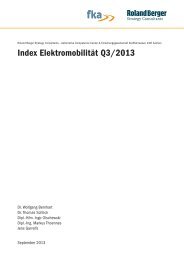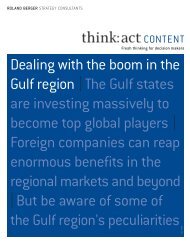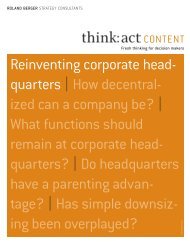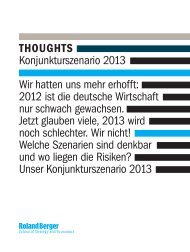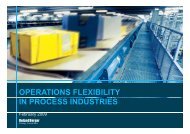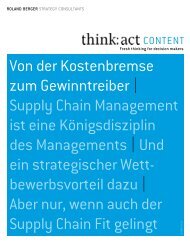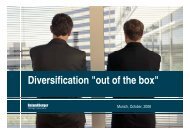English print version of the interview (PDF, 103 KB) - Roland Berger ...
English print version of the interview (PDF, 103 KB) - Roland Berger ...
English print version of the interview (PDF, 103 KB) - Roland Berger ...
Create successful ePaper yourself
Turn your PDF publications into a flip-book with our unique Google optimized e-Paper software.
SAP Agenda TVCloud computing white paper by <strong>Roland</strong> <strong>Berger</strong> and SAPSpeaker: Cloud computing is seen as one <strong>of</strong> <strong>the</strong> fastest growing IT marketsworldwide. The BITKOM industry association forecasts 55% growth this year for <strong>the</strong>cloud segment alone. <strong>Roland</strong> <strong>Berger</strong> Strategy Consultants also see cloud technologyas a new development stage in IT with enormous potential. And Walldorf-based SAPrecently announced its interest in acquiring SuccessFactors, a company specializingin cloud-based solutions for human capital management. <strong>Roland</strong> <strong>Berger</strong> and SAPhave jointly produced a white paper entitled "Survival <strong>of</strong> <strong>the</strong> fittest", which argues thatEurope has a great opportunity to assume a leading role in this IT segment. For thisto happen, however, <strong>the</strong> right framework must be put in place.Carsten Rossbach: We are a bit worried that, on <strong>the</strong> supply side, European cloudproviders are not active at <strong>the</strong> cutting edge. They could fall behind when it comes toreaping <strong>the</strong> benefits and exploiting <strong>the</strong> wider economic potential. Yet, in terms <strong>of</strong>skills, resources and companies, I believe that we have everything needed to becomeglobal leaders in various segments <strong>of</strong> cloud services. For this to happen, however,<strong>the</strong>re are still a few requirements to be established.Speaker: One thing holding back <strong>the</strong> advance <strong>of</strong> cloud computing is undoubtedly <strong>the</strong>question <strong>of</strong> security. True, a survey has just shown that 87% <strong>of</strong> German businessesthink that switching to <strong>the</strong> cloud does not, on principle, mean less IT security. Butwhen firms plan this move, <strong>the</strong>y have enormous worries about guaranteeing a securecloud environment. What German companies most fear is malicious code and data<strong>the</strong>ft by hackers.Carsten Rossbach: Security risks are a real problem and come in many differentforms. We should distinguish here between two major areas. One is about <strong>the</strong> caretaken in designing all <strong>the</strong> structures, systems and processes that surround cloudservices. This means following <strong>the</strong> law, sticking to rules and complying with all <strong>the</strong>relevant obligations.The second area is concerned with countering external threats. I'm talking here abouta whole range <strong>of</strong> different threats – ranging from organized crime to things like cyberwarfare and corporate espionage. We have here a set <strong>of</strong> very real problems thatdemand answers. And <strong>the</strong> answers aren't simple. But we believe we have identified afew things in our study that enable us to address <strong>the</strong>se issues.Speaker: Yes, from Carsten Rossbach's perspective, this would start with <strong>the</strong> idea <strong>of</strong>building on one's own strengths. As an author <strong>of</strong> <strong>the</strong> study, he has identified one <strong>of</strong>those strengths in <strong>the</strong> very area that is frequently regarded as a drag on Europeancooperation.
Carsten Rossbach: We used to talk a lot about red tape and administrative burdensin Europe, especially in relation to regulations for data protection and so on. But <strong>the</strong>way forward now is, I believe, to turn this supposed weakness into a strength –similar to <strong>the</strong> way "Made in Germany" was initially thought <strong>of</strong> as a stigma but <strong>the</strong>nbecame a major factor behind <strong>the</strong> success <strong>of</strong> German exports. The same thing mustnow be created in Europe for <strong>the</strong> cloud. We can take <strong>the</strong> alleged weakness <strong>of</strong> veryintensive and rigorously designed regulation, for example in data protection, andactually make it a strength in <strong>the</strong> form <strong>of</strong> a quality seal for exports.We have good data protection rules, but we have 27 different regulatory regimesacross <strong>the</strong> EU. The providers have to comply with different sets <strong>of</strong> rules, dependingon <strong>the</strong>ir geographical alignment, as do <strong>the</strong> users, depending on <strong>the</strong>ir geographicallocation. It would definitely make sense here to establish a clear set <strong>of</strong> harmonizedrules that would simplify this matter.Speaker: Governments set <strong>the</strong> course, businesses set <strong>the</strong> pace. The authors <strong>of</strong> thisanalysis want to help <strong>the</strong> cloud to make its breakthrough on <strong>the</strong> "old continent" bymeans <strong>of</strong> a roadmap for Europe that passes through five stations on <strong>the</strong> path tointernational leadership.These 5 stations are: Harmonize <strong>the</strong> legal framework Promote research and development Incentivize small, fast-growing companies Position <strong>the</strong> public sector as a pioneering user Establish a quality seal.Your consultancy attaches great importance to this last point. By laying down <strong>the</strong>requirements for secure cloud computing, <strong>the</strong> quality seal will create greaterconfidence among users.Carsten Rossbach: There are, <strong>of</strong> course, many different factors behind cloudsecurity. They cover processes, systems and specifications. In our idea <strong>of</strong> aEuropean Cloud Gold Standard, <strong>the</strong>se diverse factors are bundled into one qualityseal. Creating this standard and enforcing compliance would clearly be a big stepforward in giving users <strong>the</strong> trust and confidence <strong>the</strong>y need. This can relate to differentlevels. For example, we attach a lot <strong>of</strong> importance to standard contract clauses.Drafts for such clauses already exist, and <strong>the</strong> European Commission has already setout some initial <strong>version</strong>s. But we believe <strong>the</strong>re is far more to be done here in makinglife as easy as possible for users and providers in <strong>the</strong> cloud.2



